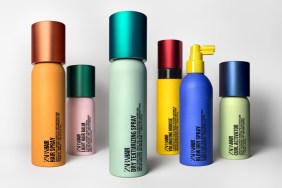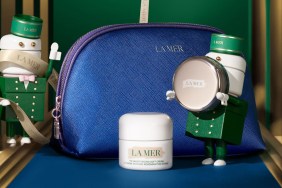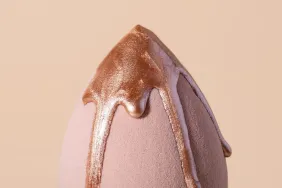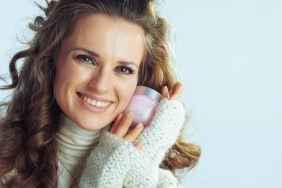

Yesterday, Renee Rouleau and Dr. Lipman gave us the scoop on staying healthy, feeling great, and looking good all winter long. Today, world-renowned hair stylist Oribe, famed makeup artist Sonia Kashuk, and fitness expert Joe Dowdell tell us what we can do to avoid dry, brittle hair, stay motivated to workout when the temperatures drop, and whether there’s such a thing as season-less makeup shades.
Hair Tips from Oribe
Dry and brittle hair often goes hand-in-hand with winter. To avoid the effects that dry air can have on our tresses, Oribe says, “It’s all about adding extra moisture,” adding that we should use a deep-conditioning masque, such as his Signature Moisture Masque or Masque for Beautiful Color twice a week, or even daily as a quick rinse. “It will help fortify strands before they break and repair hair that is already brittle,” he says.
To keep hair nice and shiny Oribe also recommends using a leave-in conditioner like Supershine Moisturizing Cream: “Luster is one of the best ways of keeping hair looking healthy in the winter.”
As most of us know, heat styling tools tend to suck out moisture, so I wondered whether Oribe had any quick blow drying tips and to that end he suggests “blow drying hair with the nozzle aiming down the hair shaft to keep cuticles smooth and enhance shine.” The stylist also notes that “when looking for body and movement, spritz a volumizing spray like my Volumista which swells each hair shaft to add natural-looking lift throughout wet hair and blow-dry hair in sections. For super-straight locks, a heat-styling spray such as Soft Lacquer will keep strands in place while adding high shine. Royal Blowout Heat Styling Spray also provides heat protection while speeding blow-dry time and leaving hair soft and shiny.”
Fitness Tips from Joe Dowdell

“People need to realize that during the winter, our bodies are always trying to maintain their internal temperature of 98.6 degrees as a survival mechanism,” says Dowdell. “If you want to minimize any negative impact on your performance, you must dress appropriately in order to try to maintain this temperature.” Dowdell also underscores the following if exercising outdoors in the cold:
- At the beginning of your exercise session, the body is able to generate sufficient body heat, but as fatigue sets in and muscle activity declines, such may be the case during a long distance run, the body’s ability to generate internal heat will decrease. If you’re not cognizant of this, hypothermia can take place, resulting in a very dangerous situation.
- You should also take some extra time to warm up properly, which doesn’t mean a few static stretches. You need to do a 10-15 minute thorough dynamic warm up. Research shows that a warm muscle will function more optimally than a cold one. Simply put, a cold muscle will fatigue more rapidly. In addition, the likelihood of possibly sustaining an injury will be greater.
When it comes to fitness and cold weather, the hardest part is staying motivated to stick with your fitness routine and to that end Dowdell recommends the following:
- One of the best motivational tips for getting to the gym when the weather is bad is to try and plan a little vacation to a beach destination. Nothing gets people more motivated than knowing they are going to have to wear a swimsuit in public in a couple of months.
- Also, try and find a training partner. If you know that you have to meet someone at the gym, you are less likely to blow it off.
- Try to find a few friends and/or relatives that you can call upon for support especially when you don’t feel like training or you feel like you are starting to eat poorly. When other people know what your goals are, you are less likely to break your plan.
Given the change in environmental aggressors you may be wondering if you should eat/prepare for a workout differently in the winter than in the summer. According to Dowdell, no:
- I don’t think you should eat or prepare any differently in the winter. You should always eat healthy and be exercising year round.
- Just because it’s wintertime and it’s cold outside, it doesn’t mean you we need less water. Be sure to stay well hydrated while training.
- Always follow up your strength training sessions with a post-workout protein shake. It will help jump-start the recovery process.
Cosmetic tips from Sonia Kashuk

“Moisturize, moisturize, moisturize!” exclaims Kashuk. “It’s key to keep your skin quenched in the harsher winter months. Be sure to apply an intensely hydrating cream all over, both morning and night. My personal favorite for the face is StriVectin’s Instant Moisture Repair. Also, don’t forget about your lips – swiping on some Vaseline before bed is vital. Nothing is worse than a cracked and flaky pout, which will only be amplified by lipstick. Once your skin is in prime condition, you can use your makeup to bring life to the skin. Start by creating luminosity with a tinted moisturizer, try my Radiant Tinted Moisturizer and add some color with a bronzer, like my Bare Minimum Pressed Powder Bronzer. Most people normally associate bronzer with the summer, but I find it is more important in the winter months to add a natural, healthy glow to the skin. Just be sure to keep application sheer and finish with a flush of cream blush. So remember, for perfect winter skin, create brightness with a tinted moisturizer, tone with a bronzer, and brightness with a blush.”
We always hear about “hot colors” of the season, but according to Kashuk “color has become rather season-less.” She remarks, “Before you would stay away from corals or bright colors in the winter, but those rules don’t really exist anymore. Now you have an endless variety of shades to choose from. In the summer you would never wear darker hues, but in the winter you can go for rich and deep or bold and bright, whichever you choose color in the winter will look fresh and modern.”
Given that both Kashuk and Renee Rouleau underscored how important it is to make sure our skin is properly hydrated, are there any particular products we should buy considering the weather (moisturizing foundation, for example)? “Know that your skin changes with the weather and use products accordingly,” says Kashuk adding, “go light on the powder and stick to creams/liquids, which are better suited for the dry winter climate. The most important thing to realize is that product textures will change season to season as a direct correlation to the weather, but the finish of the skin should always be luminous and radiant.”








